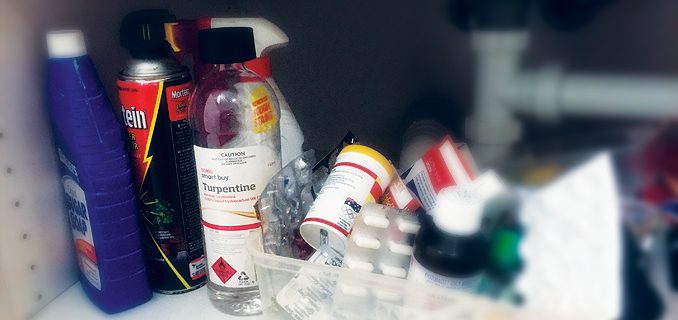
Lucia Moon explains why chemicals are risky business.
The annual Canada Bay Chemical CleanOut event is coming up on November 5.
The service provides a way for inner west household members to dispose of their leftover household chemicals – such as cleaners, pesticides, herbicides, paint, acids and motor fuels – safely. Chemicals received at the event are normally recycled rather than ending up in landfill, where they may leak toxic elements such as mercury, cadmium and lead into the environment.
You may think that proper disposal of chemicals by the authorities is adequate in defending the city and ourselves from harmful contamination. The reality is that chemicals are used excessively and without care all over Sydney. Contamination is continuous despite ‘safe deposit’ practices. The state of the harbour can testify to that.
Sydney Harbour may seem to be the picturesque estuary of your dreams, however, below the surface things are not so pretty. Harbour sediments contain a variety of contaminants, the worst of which are dioxins (a byproduct of herbicide production), heavy metals and pesticides.
The most polluted sediments are found in Homebush Bay, Hen & Chicken Bay, Iron Cove, Rozelle Bay, Blackwattle Bay and Long Bay. So the Inner West waters are pretty much the most polluted in all of Sydney.
Besides chemicals, micro-plastics (fragments smaller than 5mm) are present in alarming quantities. The largest sources are micro-beads, which are found in products such as face wash, and non-biodegradable polyester clothing fibres from dryers or washing machines.
How do these substances enter our waterways? A lot of sediment contaminants entered the harbour prior to 1970, when industrial practices were poorly regulated. However, nowadays, one of the main entry points is stormwater. Stormwater is a mixture of rain and any dissolved or solid pollutants carried along with it. Water flowing along gutters picks up litter, oil, fibres, metals, fertilisers, pesticides and pathogens.
People are often very quick to complain about water quality, particularly at their favourite beach, unaware that their very own practices are contributing to the mess. Car washing is a problem. Minimum amounts of detergent should be used, and the car should be washed on the grass or gravel so the excess does not flow down the drain. A better option is to take your car to a car wash, where the water is recycled.
Where possible, consider natural alternatives to products such as pesticides, face washes, and clothing. Instead of micro-beads, wash your skin with oats. They are naturally disinfecting and moisturising.
Instead of liberally applying chemical pesticides, hand-pull weeds and plant natives to build up a naturally defensive eco-system. And buy clothing made from natural materials, such as cotton, not polyester.
Chemicals are certainly risky business, and the detrimental impacts tend to reveal themselves further down the track. Remember the asbestos debacle. Indeed, one of the most widely used pesticides in Australia, RoundUp glyphosate, has recently come under fire after an investigation by the World Health Organisation (WHO) warned the chemical probably causes cancer.
We must attempt to use organic substances where possible, and yes, dispose of any necessary chemicals according to council regulation.